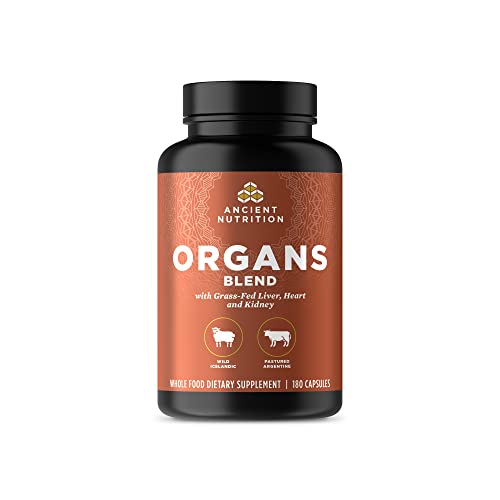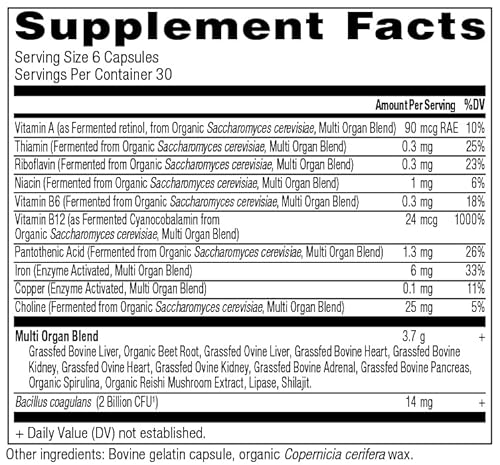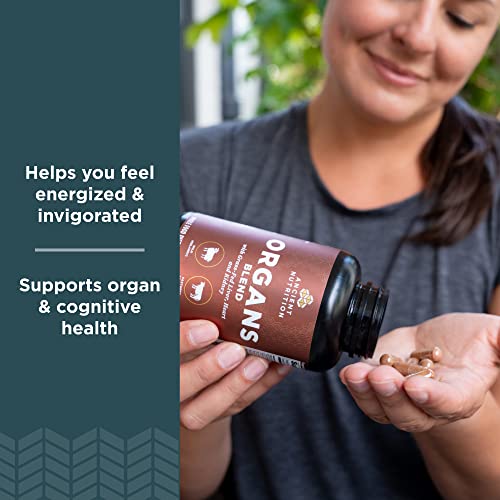








Ancient Nutrition Liver Supplement - Supports Organ, Cognitive & Immune Health - 180 Ct


Choline
High RiskCholine is a water-soluble nutrient that plays a crucial role in various bodily functions, including cell membrane integrity, neurotransmission, and lipid metabolism. It is often included in dietary supplements and functional foods to support overall health and cognitive function.
Sustai Insights
Choline is recognized for its functional benefits in supporting liver function and brain health. However, it carries regulatory warnings due to high usage restrictions and potential health risks, albeit low concerns regarding carcinogenicity and allergies. Environmental risks are minimal, with no significant pollutant or bioaccumulative properties reported. Given these factors, the overall risk assessment indicates a high level of caution in its use, necessitating careful consideration of dosage and potential alternatives.
Retinol (Vitamin A)
High RiskRetinol (vitamin A) is a naturally occurring substance primarily known for its role in skin health, often included in products aimed at improving skin texture and reducing signs of aging. It functions as a potent ingredient in skincare formulations, enhancing cellular turnover and promoting collagen production.
Sustai Insights
Retinol offers functional benefits such as enhancing skin absorption and improving skin appearance through increased turnover and collagen synthesis. However, its usage is associated with high concerns regarding developmental and reproductive toxicity and potential irritation. Environmental risks include its contribution to pollution, while regulatory bodies impose strict usage restrictions. Overall, the risk level is assessed as high, necessitating careful consideration in its application and the exploration of safer alternatives.
Vitamin B3
Low RiskVitamin B3, also known as niacin or nicotinic acid, is an organic compound that plays a crucial role in various metabolic processes in the body. It is commonly used in cosmetic formulations for its ability to improve skin texture and enhance moisture retention, thereby contributing to overall skin health.
Sustai Insights
Vitamin B3 offers functional benefits such as improving skin hydration, reducing the appearance of fine lines, and enhancing overall skin tone. It is generally recognized as safe, with low associated health risks, including minimal concerns for carcinogenicity, allergies, or reproductive toxicity. Environmentally, it poses low risks and is not classified as a pollutant or bioaccumulative. Regulatory bodies have not placed substantial restrictions on its use, affirming its safety in cosmetic applications. Overall, Vitamin B3 is considered a low-risk ingredient, with no significant adverse effects reported. Safe usage practices include using within recommended concentrations, and alternatives like Vitamin B5 can be considered for similar benefits.
Thiamin
Low RiskThiamin, also known as vitamin B1, is a water-soluble vitamin essential for carbohydrate metabolism and nerve function. It serves as a coenzyme in the conversion of food into energy and is important for maintaining healthy nerve cells and muscle function.
Sustai Insights
Thiamin plays a crucial role in energy metabolism and supports nerve health, with minimal associated health risks such as low carcinogenicity and low allergenic potential. It is not currently subject to restrictions by regulatory bodies. While thiamin is not known to pose significant environmental risks, its production should be monitored for sustainability. Safe usage practices include ensuring adequate dietary intake, particularly in vulnerable populations. Given the overall low risk associated with thiamin, it is considered a safe ingredient in product formulations.
Iron
Low RiskIron is a mineral that plays a vital role in various biological processes, primarily as a component of hemoglobin in red blood cells, facilitating oxygen transport. It is commonly used in dietary supplements and food fortification to address iron deficiency and support overall health.
Sustai Insights
Iron offers essential functional benefits, such as improving oxygen circulation and supporting metabolic processes. It is generally considered safe with low risks for carcinogenicity, allergenic potential, and reproductive toxicity. Regulatory bodies like the FDA do not impose significant restrictions on its use. However, excessive iron intake can lead to health risks, including toxicity. Environmentally, iron is not known to be a pollutant or bioaccumulative. Overall, iron is assessed as low risk, with safe usage practices advised, including monitoring intake levels. Alternatives for supplementation include dietary sources like spinach and legumes.
Riboflavin
Low RiskRiboflavin, also known as Vitamin B2, is a water-soluble vitamin essential for energy production and cellular function. It plays a critical role in the metabolism of fats, carbohydrates, and proteins, and is commonly used as a dietary supplement and food additive for its color and nutritional benefits.
Sustai Insights
Riboflavin offers functional benefits, including its role in energy metabolism and as a food colorant. It is generally recognized as safe with low risk for allergies, carcinogenicity, and reproductive toxicity. However, excessive intake can lead to minor side effects such as yellow urine. Environmentally, riboflavin poses low pollutant potential and is not bioaccumulative. Regulatory bodies like the FDA have approved its use, establishing a low risk profile overall. Recommended usage levels are safe, and alternatives include other B vitamins, ensuring a balanced intake.
Cyanocobalamin (Vitamin B12)
Low RiskCyanocobalamin, commonly known as vitamin B12, is a water-soluble vitamin essential for red blood cell formation, neurological function, and DNA synthesis. It is utilized in dietary supplements and fortified foods to prevent or treat B12 deficiency, particularly in individuals with limited dietary intake or absorption issues.
Sustai Insights
Cyanocobalamin serves critical physiological functions including energy metabolism and red blood cell production. It is deemed safe with low health risk concerns across various categories such as cancer, allergies, and reproductive toxicity. Environmental impact is minimal, lacking bioaccumulation or significant pollutants. Regulatory bodies, including the FDA, recognize its safety, affirming low risk overall. Recommended usage involves adherence to established dietary allowances, with few noted alternatives. Therefore, the overall assessment indicates low risk.
Pyridoxine
Low RiskPyridoxine is a substituted aromatic compound, primarily known as vitamin B6. It plays a crucial role in various metabolic processes, including amino acid metabolism, neurotransmitter synthesis, and the production of hemoglobin.
Sustai Insights
Pyridoxine serves essential functions in metabolic processes and is vital for overall health. It poses low health risks, with minimal concerns related to carcinogenicity, allergies, or reproductive toxicity. Environmentally, it is not considered a pollutant or bioaccumulative. Regulatory bodies have not imposed significant restrictions, indicating a low risk overall. Safe usage practices are encouraged, and alternatives like other B vitamins can be considered.
Gelatin
Low RiskGelatin is a product obtained by the partial hydrolysis of collagen, a protein derived from animal sources, primarily from the skin and bones of pigs and cows. It is commonly used as a gelling agent, thickener, and stabilizer in various food products, pharmaceuticals, and cosmetics.
Sustai Insights
Gelatin serves as an effective gelling agent and thickener, widely utilized in food, pharmaceuticals, and cosmetics. It is generally recognized as safe, with low associated risks for carcinogenicity, allergies, and reproductive toxicity. Environmental concerns are minimal, as it is biodegradable and sourced from animal byproducts. Regulatory bodies impose few restrictions, affirming its safety for use. Overall, gelatin presents a low-risk profile, making it a reliable ingredient in various applications.
Carnauba Wax Extract
Low RiskCarnauba wax extract is a natural wax derived from the leaves of the Brazilian carnauba palm (Copernicia prunifera). It is primarily used as a glazing agent, thickener, and emulsifier in various cosmetic and personal care products due to its ability to form a protective barrier and enhance product texture.
Sustai Insights
Carnauba wax extract offers functional benefits by providing texture, stability, and moisture retention in formulations. It is sustainably sourced and biodegradable. Health risks are low, with no significant concerns regarding carcinogenicity, allergenic potential, or reproductive toxicity. Environmentally, it poses minimal risks, being non-pollutant and non-bioaccumulative. There are no current regulatory warnings against its use. Overall, the risk level is assessed as low, making it a safe ingredient choice with no known adverse effects. While alternatives exist, carnauba wax remains a viable and sustainable option.
Choline
High RiskCholine is a water-soluble nutrient that plays a crucial role in various bodily functions, including cell membrane integrity, neurotransmission, and lipid metabolism. It is often included in dietary supplements and functional foods to support overall health and cognitive function.
Sustai Insights
Choline is recognized for its functional benefits in supporting liver function and brain health. However, it carries regulatory warnings due to high usage restrictions and potential health risks, albeit low concerns regarding carcinogenicity and allergies. Environmental risks are minimal, with no significant pollutant or bioaccumulative properties reported. Given these factors, the overall risk assessment indicates a high level of caution in its use, necessitating careful consideration of dosage and potential alternatives.
Vitamin B3
Low RiskVitamin B3, also known as niacin or nicotinic acid, is an organic compound that plays a crucial role in various metabolic processes in the body. It is commonly used in cosmetic formulations for its ability to improve skin texture and enhance moisture retention, thereby contributing to overall skin health.
Sustai Insights
Vitamin B3 offers functional benefits such as improving skin hydration, reducing the appearance of fine lines, and enhancing overall skin tone. It is generally recognized as safe, with low associated health risks, including minimal concerns for carcinogenicity, allergies, or reproductive toxicity. Environmentally, it poses low risks and is not classified as a pollutant or bioaccumulative. Regulatory bodies have not placed substantial restrictions on its use, affirming its safety in cosmetic applications. Overall, Vitamin B3 is considered a low-risk ingredient, with no significant adverse effects reported. Safe usage practices include using within recommended concentrations, and alternatives like Vitamin B5 can be considered for similar benefits.
Thiamin
Low RiskThiamin, also known as vitamin B1, is a water-soluble vitamin essential for carbohydrate metabolism and nerve function. It serves as a coenzyme in the conversion of food into energy and is important for maintaining healthy nerve cells and muscle function.
Sustai Insights
Thiamin plays a crucial role in energy metabolism and supports nerve health, with minimal associated health risks such as low carcinogenicity and low allergenic potential. It is not currently subject to restrictions by regulatory bodies. While thiamin is not known to pose significant environmental risks, its production should be monitored for sustainability. Safe usage practices include ensuring adequate dietary intake, particularly in vulnerable populations. Given the overall low risk associated with thiamin, it is considered a safe ingredient in product formulations.
Iron
Low RiskIron is a mineral that plays a vital role in various biological processes, primarily as a component of hemoglobin in red blood cells, facilitating oxygen transport. It is commonly used in dietary supplements and food fortification to address iron deficiency and support overall health.
Sustai Insights
Iron offers essential functional benefits, such as improving oxygen circulation and supporting metabolic processes. It is generally considered safe with low risks for carcinogenicity, allergenic potential, and reproductive toxicity. Regulatory bodies like the FDA do not impose significant restrictions on its use. However, excessive iron intake can lead to health risks, including toxicity. Environmentally, iron is not known to be a pollutant or bioaccumulative. Overall, iron is assessed as low risk, with safe usage practices advised, including monitoring intake levels. Alternatives for supplementation include dietary sources like spinach and legumes.
Riboflavin
Low RiskRiboflavin, also known as Vitamin B2, is a water-soluble vitamin essential for energy production and cellular function. It plays a critical role in the metabolism of fats, carbohydrates, and proteins, and is commonly used as a dietary supplement and food additive for its color and nutritional benefits.
Sustai Insights
Riboflavin offers functional benefits, including its role in energy metabolism and as a food colorant. It is generally recognized as safe with low risk for allergies, carcinogenicity, and reproductive toxicity. However, excessive intake can lead to minor side effects such as yellow urine. Environmentally, riboflavin poses low pollutant potential and is not bioaccumulative. Regulatory bodies like the FDA have approved its use, establishing a low risk profile overall. Recommended usage levels are safe, and alternatives include other B vitamins, ensuring a balanced intake.
Cyanocobalamin (Vitamin B12)
Low RiskCyanocobalamin, commonly known as vitamin B12, is a water-soluble vitamin essential for red blood cell formation, neurological function, and DNA synthesis. It is utilized in dietary supplements and fortified foods to prevent or treat B12 deficiency, particularly in individuals with limited dietary intake or absorption issues.
Sustai Insights
Cyanocobalamin serves critical physiological functions including energy metabolism and red blood cell production. It is deemed safe with low health risk concerns across various categories such as cancer, allergies, and reproductive toxicity. Environmental impact is minimal, lacking bioaccumulation or significant pollutants. Regulatory bodies, including the FDA, recognize its safety, affirming low risk overall. Recommended usage involves adherence to established dietary allowances, with few noted alternatives. Therefore, the overall assessment indicates low risk.
Pyridoxine
Low RiskPyridoxine is a substituted aromatic compound, primarily known as vitamin B6. It plays a crucial role in various metabolic processes, including amino acid metabolism, neurotransmitter synthesis, and the production of hemoglobin.
Sustai Insights
Pyridoxine serves essential functions in metabolic processes and is vital for overall health. It poses low health risks, with minimal concerns related to carcinogenicity, allergies, or reproductive toxicity. Environmentally, it is not considered a pollutant or bioaccumulative. Regulatory bodies have not imposed significant restrictions, indicating a low risk overall. Safe usage practices are encouraged, and alternatives like other B vitamins can be considered.
Gelatin
Low RiskGelatin is a product obtained by the partial hydrolysis of collagen, a protein derived from animal sources, primarily from the skin and bones of pigs and cows. It is commonly used as a gelling agent, thickener, and stabilizer in various food products, pharmaceuticals, and cosmetics.
Sustai Insights
Gelatin serves as an effective gelling agent and thickener, widely utilized in food, pharmaceuticals, and cosmetics. It is generally recognized as safe, with low associated risks for carcinogenicity, allergies, and reproductive toxicity. Environmental concerns are minimal, as it is biodegradable and sourced from animal byproducts. Regulatory bodies impose few restrictions, affirming its safety for use. Overall, gelatin presents a low-risk profile, making it a reliable ingredient in various applications.
Retinol (Vitamin A)
High RiskRetinol (vitamin A) is a naturally occurring substance primarily known for its role in skin health, often included in products aimed at improving skin texture and reducing signs of aging. It functions as a potent ingredient in skincare formulations, enhancing cellular turnover and promoting collagen production.
Sustai Insights
Retinol offers functional benefits such as enhancing skin absorption and improving skin appearance through increased turnover and collagen synthesis. However, its usage is associated with high concerns regarding developmental and reproductive toxicity and potential irritation. Environmental risks include its contribution to pollution, while regulatory bodies impose strict usage restrictions. Overall, the risk level is assessed as high, necessitating careful consideration in its application and the exploration of safer alternatives.
Carnauba Wax Extract
Low RiskCarnauba wax extract is a natural wax derived from the leaves of the Brazilian carnauba palm (Copernicia prunifera). It is primarily used as a glazing agent, thickener, and emulsifier in various cosmetic and personal care products due to its ability to form a protective barrier and enhance product texture.
Sustai Insights
Carnauba wax extract offers functional benefits by providing texture, stability, and moisture retention in formulations. It is sustainably sourced and biodegradable. Health risks are low, with no significant concerns regarding carcinogenicity, allergenic potential, or reproductive toxicity. Environmentally, it poses minimal risks, being non-pollutant and non-bioaccumulative. There are no current regulatory warnings against its use. Overall, the risk level is assessed as low, making it a safe ingredient choice with no known adverse effects. While alternatives exist, carnauba wax remains a viable and sustainable option.
Discover the power of Ancient Nutrition's Organ Supplements, a premium liver supplement designed to support your organ, cognitive, and immune health. Sourced from grass-fed bovine organs in Argentina and wild lamb organs in Iceland, this whole food supplement is rich in essential vitamins, minerals, and amino acids for optimal absorption and effectiveness.
- Whole Food Nutrition: Packed with nutrients from grass-fed and wild organs, offering a natural solution to enhance overall health.
- Six Kingdom Approach: Supports immune function, digestion, and energy, drawing benefits from various biological kingdoms.
- Daily Wellness: Just six capsules a day can promote comprehensive organ and cognitive health.
- Clinically Studied Ingredients: Formulated with ancient wisdom and modern science, rigorously tested for efficacy and safety.
- Made in the U.S.A.: Produced under GMP certification, ensuring high-quality standards for every bottle.
Empower your health journey with a supplement that combines tradition and science for holistic well-being.
Subscribe & Save with Sustai
- Best Price Guarantee: Always enjoy the lowest prices on sustainable home essentials.
- No Surprises: We’ll notify you before shipping. No hidden fees, ever.
- You’re in Charge: Change, pause, or cancel your subscription anytime with ease.
- Eco-Friendly Deliveries: Our grouped shipments mean less packaging and lower emissions.
Join us on a sustainable journey. Special offers for a limited time! Prices and promotions may change.
Recommended Products
Discover the power of Ancient Nutrition's Organ Supplements, a premium liver supplement designed to support your organ, cognitive, and immune health. Sourced from grass-fed bovine organs in Argentina and wild lamb organs in Iceland, this whole food supplement is rich in essential vitamins, minerals, and amino acids for optimal absorption and effectiveness.
- Whole Food Nutrition: Packed with nutrients from grass-fed and wild organs, offering a natural solution to enhance overall health.
- Six Kingdom Approach: Supports immune function, digestion, and energy, drawing benefits from various biological kingdoms.
- Daily Wellness: Just six capsules a day can promote comprehensive organ and cognitive health.
- Clinically Studied Ingredients: Formulated with ancient wisdom and modern science, rigorously tested for efficacy and safety.
- Made in the U.S.A.: Produced under GMP certification, ensuring high-quality standards for every bottle.
Empower your health journey with a supplement that combines tradition and science for holistic well-being.

You can have at most 2 Sustainable Steals products in your cart
Customer Reviews
Customers’ View
Customers appreciate the effectiveness and natural formulation of this dietary supplement, particularly noting its positive impact on energy levels. Many users report feeling an increase in energy, aiding in both daily activities and gym performance, with some mentioning improvements in fatigue and overall health. Additionally, the product's pleasant smell and easy-to-swallow capsules have been highlighted as significant benefits, distinguishing it from other organ supplements. Users also express satisfaction with the product's value for money, considering its high-quality ingredients. Overall, customers find this supplement aligns well with their health-conscious values, contributing to their well-being without compromising on quality.
AI-generated from the text of customer reviewsThis product is rated 5.0 of 5.0 stars.
It has received 11 reviews.




